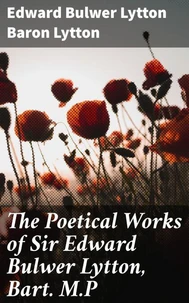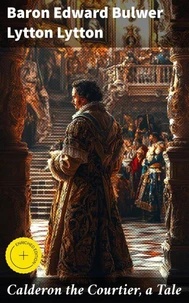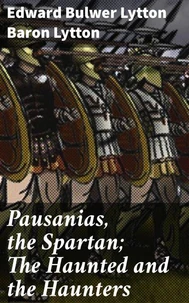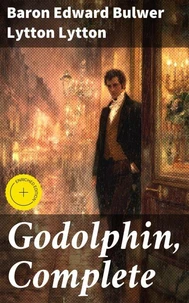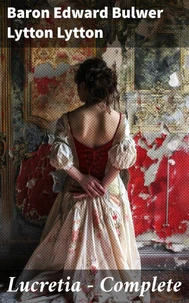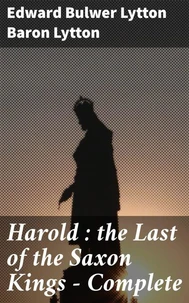The Last of the Barons — Complete. Intrigue and Ambition in Medieval England: A Tale of Power and Politics
Par :Formats :
Disponible dans votre compte client Decitre ou Furet du Nord dès validation de votre commande. Le format ePub est :
- Compatible avec une lecture sur My Vivlio (smartphone, tablette, ordinateur)
- Compatible avec une lecture sur liseuses Vivlio
- Pour les liseuses autres que Vivlio, vous devez utiliser le logiciel Adobe Digital Edition. Non compatible avec la lecture sur les liseuses Kindle, Remarkable et Sony
 , qui est-ce ?
, qui est-ce ?Notre partenaire de plateforme de lecture numérique où vous retrouverez l'ensemble de vos ebooks gratuitement
Pour en savoir plus sur nos ebooks, consultez notre aide en ligne ici
- Nombre de pages663
- FormatePub
- ISBN4057664617972
- EAN4057664617972
- Date de parution25/11/2019
- Protection num.Digital Watermarking
- Taille1 Mo
- Infos supplémentairesepub
- ÉditeurGOOD PRESS
Résumé
Baron Edward Bulwer Lytton's "The Last of the Barons" is a historical novel set against the tumultuous backdrop of 15th-century England during the Wars of the Roses. This work masterfully intertwines elements of politics, military strategy, and romantic intrigue, employing a rich, descriptive literary style that characterizes Lytton'Äôs narrative prowess. The novel's structure reflects influences of both Gothic and Romantic literature, richly portraying the struggles of its protagonists amidst the vivid sociopolitical landscape of the era.
Through intricate character development and evocative dialogue, Lytton delves into themes of loyalty, ambition, and the moral complexities of power, particularly as embodied by the titular character, the Earl of Warwick. Edward Bulwer Lytton, a prominent figure in Victorian literature, was deeply influenced by the political climate of his time, as well as by his own aristocratic background. His experiences in Parliament and his fascination with historical events fuel his narrative, providing authentic insights into the nature of leadership and governance.
Lytton's vast literary output, including dramas and romances, showcases his commitment to exploring human experience, making him a pivotal figure in the development of the historical novel genre. This compelling work is highly recommended for readers interested in rich historical narratives, character-driven plots, and the interplay between history and human emotion. Lytton'Äôs exploration of the intricacies of power dynamics and personal ambition invites readers to reflect on the relevance of these themes in contemporary society, making "The Last of the Barons" a timeless and thought-provoking read.
Through intricate character development and evocative dialogue, Lytton delves into themes of loyalty, ambition, and the moral complexities of power, particularly as embodied by the titular character, the Earl of Warwick. Edward Bulwer Lytton, a prominent figure in Victorian literature, was deeply influenced by the political climate of his time, as well as by his own aristocratic background. His experiences in Parliament and his fascination with historical events fuel his narrative, providing authentic insights into the nature of leadership and governance.
Lytton's vast literary output, including dramas and romances, showcases his commitment to exploring human experience, making him a pivotal figure in the development of the historical novel genre. This compelling work is highly recommended for readers interested in rich historical narratives, character-driven plots, and the interplay between history and human emotion. Lytton'Äôs exploration of the intricacies of power dynamics and personal ambition invites readers to reflect on the relevance of these themes in contemporary society, making "The Last of the Barons" a timeless and thought-provoking read.
Baron Edward Bulwer Lytton's "The Last of the Barons" is a historical novel set against the tumultuous backdrop of 15th-century England during the Wars of the Roses. This work masterfully intertwines elements of politics, military strategy, and romantic intrigue, employing a rich, descriptive literary style that characterizes Lytton'Äôs narrative prowess. The novel's structure reflects influences of both Gothic and Romantic literature, richly portraying the struggles of its protagonists amidst the vivid sociopolitical landscape of the era.
Through intricate character development and evocative dialogue, Lytton delves into themes of loyalty, ambition, and the moral complexities of power, particularly as embodied by the titular character, the Earl of Warwick. Edward Bulwer Lytton, a prominent figure in Victorian literature, was deeply influenced by the political climate of his time, as well as by his own aristocratic background. His experiences in Parliament and his fascination with historical events fuel his narrative, providing authentic insights into the nature of leadership and governance.
Lytton's vast literary output, including dramas and romances, showcases his commitment to exploring human experience, making him a pivotal figure in the development of the historical novel genre. This compelling work is highly recommended for readers interested in rich historical narratives, character-driven plots, and the interplay between history and human emotion. Lytton'Äôs exploration of the intricacies of power dynamics and personal ambition invites readers to reflect on the relevance of these themes in contemporary society, making "The Last of the Barons" a timeless and thought-provoking read.
Through intricate character development and evocative dialogue, Lytton delves into themes of loyalty, ambition, and the moral complexities of power, particularly as embodied by the titular character, the Earl of Warwick. Edward Bulwer Lytton, a prominent figure in Victorian literature, was deeply influenced by the political climate of his time, as well as by his own aristocratic background. His experiences in Parliament and his fascination with historical events fuel his narrative, providing authentic insights into the nature of leadership and governance.
Lytton's vast literary output, including dramas and romances, showcases his commitment to exploring human experience, making him a pivotal figure in the development of the historical novel genre. This compelling work is highly recommended for readers interested in rich historical narratives, character-driven plots, and the interplay between history and human emotion. Lytton'Äôs exploration of the intricacies of power dynamics and personal ambition invites readers to reflect on the relevance of these themes in contemporary society, making "The Last of the Barons" a timeless and thought-provoking read.




